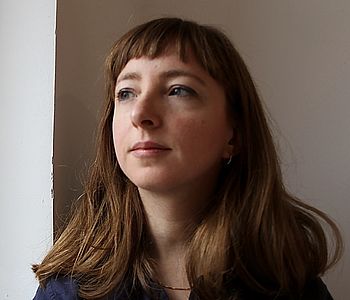Dr. Noa Levin | Associated Researcher

Home Institution
:
Università della Svizzera italiana
|
Disciplines
:
Philosophy
,
Architecture
|
Biography
Noa Levin is a postdoctoral researcher in philosophy and theory of architecture and the environment at the Università della Svizzera italiana, and an associated researcher at the Centre Marc Bloch. Her research interests include the politics of climate change, philosophy and history of science and environmental media theory. She holds a PhD from the Centre for Research in Modern European Philosophy at Kingston University, London, an MPhil in European Culture and Literature from the University of Cambridge, and a BFA in philosophy and film from Tel Aviv University.
Title of thesis
Living Mirrors of the Universe: Expression and Perspectivism in Benjamin and Deleuze after LeibnizInstitution of thesis
Supervisor
Organisation of Events
7/2019 ‘Übersetzungen von Gewalt’ workshop on Walter Benjamins ‘Zur Kritik der Gewalt’, supported by Centre Marc Bloch and ZfL, Berlin.
6/2017 ‘Benjamin and Leibniz: On Expression’ workshop, supported by Goldsmiths University of London, The London Graduate School, and CRMEP at Kingston University.
Environmental Histories and Philosophies of AI
This project focuses on the climatic histories, philosophies and iconologies of AI, interrogating the tensions between AI technologies and infrastructures on one hand, and climate on the other, from the inception of AI. While there is growing awareness of the scale of natural resources extracted and consumed by AI technologies and infrastructures, less attention has been paid to how these are intertwined with the climate ideologies of key AI theorists. Additionally, the visual representation of the climate crisis by AI-generated media—often presenting a binary view of an apocalyptic or utopian future—has yet to be systematically studied. This project will focus on a Euroepan perspective on AI infrastrctures, using historical, theoretical and media-analytical tools to fill these lacunae.
Benjamin, Deleuze and the Baroque The Early Modern Origins of Media Theory
February 06, 2025Noa Levin
Edition: 1st
ISBN: 9781350414211
For Walter Benjamin and Gilles Deleuze, who both authored seminal theoretical works on early cinema and photography, the history of modern media begins much earlier, in Baroque culture and science. Benjamin, Deleuze and the Baroque argues that their media theories were informed by their respective readings of the philosophy and mathematics of G.W. Leibniz, and the Baroque can thus be seen as the locus of modern media.
By critically comparing Benjamin and Deleuze's interpretations of the Baroque, Levin demonstrates the extent to which their theories of visual culture are intertwined with critiques of Enlightenment historiography and politics. Using a hermeneutic comparative approach, this book argues that the juxtaposition of Benjamin's reception of Leibniz with Deleuze's highlights the extent to which both authors' theories of image and media were informed by Leibniz's concepts of expression and perspectivism, themselves inspired by ground-breaking evolutions in optics and perspective. Providing close readings of Deleuze's The Fold and Benjamin's Origin of the German Trauerspiel, which remain understudied in the English language, it explores how, in their dual roles of philosopher and cultural critic, the pair may illuminate our own age of multiple crises through the Baroque.
Table of Contents
Introduction
I. A Strange Encounter
II. Redefining the Baroque
III. Leibniz, Paradigmatic Baroque Philosopher
Chapter 1: Of Monads and Mirrors: Leibniz's Monad in Deleuze and Benjamin
1.1 The Structure of Expression
1.2 Leibniz's Two Labyrinths
1.3 A Forbidden Tradition
1.4 Continuity of Knowledge and Experience
Chapter 2: Infinite Tasks of Learning: The Baroque-Inspired Critical Epistemologies of Benjamin and Deleuze
2.1 Infinite Analysis
2.2 Refiguring the Idea
2.3 The Concept of Origin
2.4 Minute Perceptions
2.5 Learning as Recollection
Chapter 3: Forces of History and Spectres of Return: The Baroque as Origin of Enlightenment Politics and Historicisms
3.1 Leibniz's Concepts of Force and Historical Progress
3.2 Virtual Histories and Infinite Totalities
3.3 Force and Violence in Origin of the German Trauerspiel
3.4 Apokatastasis and Eternal Return
3.5 Benjamin and Mallarmé on Chance and Probability
Chapter 4: It's All about Perspective: The Body Politics of the Baroque Image
4.1 Benjamin's Monadic Montage
4.2 Leibniz's Conceptions of Image and Perspective
4.3 Perspectivism and Mannerism
4.4 Allegory and Symbol
4.4 Perception and Body
Chapter 5: From the Crystal Palace to Cinematic Crystals: The Baroque Optic as Pre-cinematic Form
5.1 Between the Dialectical Image and the Crystal-Image
5.2 Deleuze and Benjamin on Montage and Montrage
5.3 The Crystal Pyramid, Leibniz's Theodicy
Conclusion
